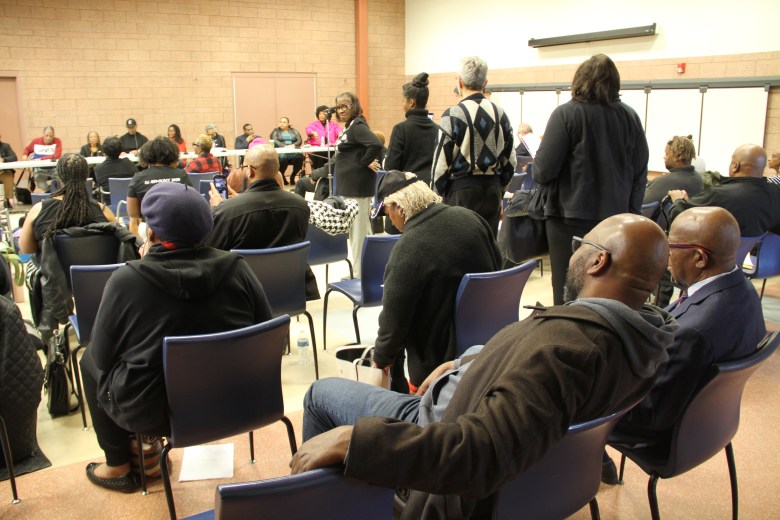Detroit’s Reparations Task Force is publicly distancing itself from policy recommendations drafted by Co-Chair Keith Williams without their input due to his frustrations with a perceived lack of progress from the group.
Williams delivered a binder of documents outlining his proposals to City Council President Mary Sheffield this week and provided a copy to BridgeDetroit. In response, the task force issued a Wednesday statement clarifying that Williams’ report does not reflect their work during the last two years and shouldn’t be considered an official document from the group.
Related:
It’s the latest challenge for the task force formed by the City Council in 2023 after Detroiters overwhelmingly backed a ballot initiative to produce reparations policies. Recommendations are due by March 31, 2025, after the City Council extended an October deadline.
Williams, who helped craft the ballot proposal, was appointed by Sheffield to lead a group of academics, activists and policy minds. For months, he’s neglected public meetings and missed internal meetings of the task force’s executive committee, citing scheduling issues. He told BridgeDetroit he’s been absent for the meetings because he no longer finds value in attending.
Williams said his own recommendations were presented “on behalf of the Michigan Democratic Party Black Caucus,” not as co-chair of the reparations task force. He gave the task force a look at the proposal before bringing it to City Council members.
“I’m trying to help facilitate this process,” Williams said. “We’ve been at this for almost two years. They’re taking too long to get this thing done.”
His recommendations center on increasing access to property and economic opportunities, including financial compensation, homebuyer assistance, small business grants, scholarships, workforce training and neighborhood investments. Williams estimated it would cost at least $2 million annually to staff a new reparations office, with additional costs for programs.

Task force Co-Chair Cidney Calloway said Williams is undermining the group and sowing unnecessary confusion about the direction of their work. Calloway said the task force is hiring a professional writer to draft official policy recommendations and is on track to meet the March 2025 deadline.
“We’re all just blindsided,” Calloway said of the report Williams gave to council members. “It’s not even like a leadership clash because in order for there to be a clash there has to be another part of leadership that has a following to it.”
Task force finds its footing
The task force stumbled out of the gate after the death of founding member JoAnn Watson and the resignation of several members.
Transparency and public engagement improved this spring after Emberly Vick was hired as a project manager, though she was succeeded by Evan Daugherty after leaving earlier this year to focus on her studies at Wayne State Law School.
Two studies were completed by the University of Michigan and Columbia University on behalf of the task force. The U-M report outlines harms caused by city policies while the Columbia report explored harms identified by Black residents.
Both reports connected discriminatory policies to inequities in food access, pollution, education, public safety, economic development and housing. The U-M report concludes that policies rooted in discrimination laid the groundwork for segregation, displacement and disinvestment for Black communities.
A survey launched this year collected feedback from residents on harms that should be addressed with reparations policies. Top-ranked priorities dealt with improving conditions in schools. Most respondents (88%) identified as residents and Black (84%).
Respondents want Detroit Public School buildings upgraded to meet code requirements, lead service pipes replaced to ensure clean drinking water, more teachers hired to reduce class sizes, free lunches and free bussing provided to Black students.
Other-high ranking proposals include reducing the tax liability of Black homeowners who were overtaxed by the city, prohibiting the Wayne County Treasurer’s Office from hold auctioning foreclosed properties, funding co-op grocery stores, home repair grants, cash payments and mental health services
It’s still unclear how the task force will pay for reparations initiatives. Possibilities include creating a nonprofit foundation, seeking money from corporations that contract with the city and using a portion of marijuana sales tax revenue. State law prevents Detroit from creating new taxes, which poses complications for raising revenue.
The City Council issued a formal apology to Black residents for “its historical role in perpetuating systemic racism and discrimination.” It outlines several specific incidents and larger injustices in Detroit’s “painful history from the 1920’s to the present day.”
Examples include the 1943 Detroit race riot and 1967 uprising, multiple eras of discriminatory policing and the 1992 murder of Malice Green, a failure to address the educational needs of Black students, redlining and the construction of freeways and industrial factories in Black neighborhoods.

Sheffield, who led the reparations ballot proposal with Williams and selected the group’s executive committee, said she’s encouraged by steps taken this year. She said reparations policies must deal with education, housing and economic justice, but she’s waiting to see what the task force recommends.
“They had a rough start, but nonetheless you have members who are dedicated to doing the work,” Sheffield said. “We’ll give them the time and grace needed, but we’re looking forward to the report that comes out. I’m going to look at all the recommendations and go from there.”
She declined to weigh in this week on Williams’ decision to submit his own plan.
Sheffield formed a campaign committee to consider running for mayor in 2025. She expects the task force’s work will continue long into the future, whether she’s in office or not. Sheffield said that may result in creation of a reparations office to guide implementation of policies adopted by the City Council.
“Even after this task force is over, I don’t think the conversation is done,” Sheffield said. “This is going to be a long-term strategy, a long term commitment for reparations.
“It’s been an interesting journey.”
‘It can’t be all my way’
Williams said he’s frustrated by delays and wants to move the work forward. He said the council could take immediate action to implement his vision.
Recommendations in Williams’ report primarily focus on access to property and economic opportunity. He suggested financial compensation, payment assistance for first-time homeowners, small business grants, establishing Black-owned banks, college scholarships, workforce training programs and neighborhood investments.
Williams calculated wage gaps between Black and white Detroiters going back to 1929 and tallied $42 billion in lost income. He estimated it would cost $2 million annually to staff a city reparations office plus tens of millions more to fund programs.
How to pay for it? Williams suggested amending the Michigan Constitution so Detroit could levy new taxes, but that would require the state Legislature to take action.
Black Bottom, a historic example of how urban planning dismantled majority-Black neighborhoods, could be a model for reparative strategies. Williams suggested board investments in affordable housing, retail spaces, business incubators, markets, outdoor plazas and cultural hubs, modern streetcars and safe streets for bikes and pedestrians.
Williams said he’s open to feedback.
“Oh lord, in this world you’ve got to compromise,” Williams said. “It can’t be all my way. But don’t take me on the journey that’s not gonna bring nothing to closure.”
Calloway said it was difficult to take his report seriously as it appeared to have been created using artificial intelligence tools. Williams confirmed that he used ChatGPT to research and write parts of the document, but that shouldn’t matter.
The conflict reflects long-running tensions between Williams and other task force members. Williams said the group pushed him away while task force members describe him as a dominating presence that hasn’t been open to collaboration.
Williams argues he’s in the best position to lead the group because he shepherded the ballot initiative which resulted in the task force. Calloway said he’s sidestepping a public process that was meant to pool the expertise of multiple community representatives and incorporates feedback from Detroiters.
“He has no idea what the work looks like, where we are in regards to any real movement and how the public meetings have changed and evolved,” Calloway said. “We didn’t have any feedback (on Williams’ report) because we didn’t even know what we were looking at for real, and because (he’s) not there to really collaborate with us.”


